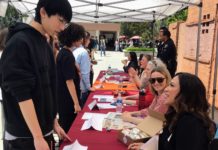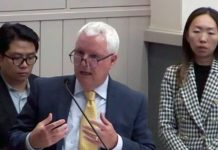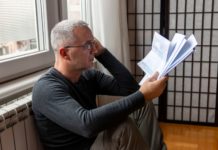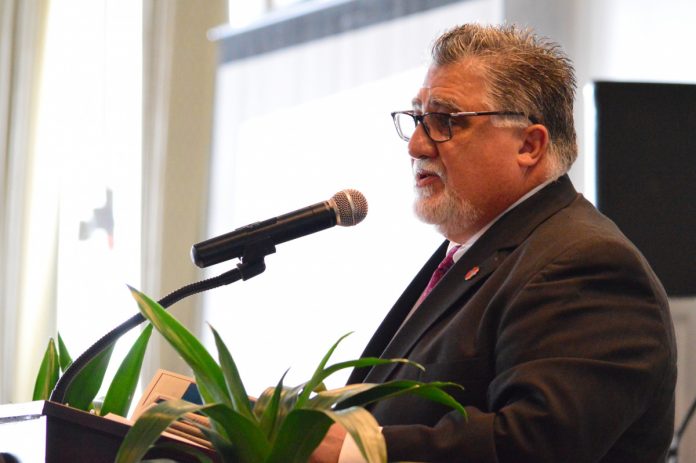During a special teleconference meeting of the South Pasadena City Council April 29, Senator Anthony Portantino (D-25th) accepted an invitation to brief city officials. Councilmembers submitted a list of questions on the state budget, small business/economy, workforce, assistance to local cities, legislative issues for local government, COVID-19 testing, environment and housing/rent issues.
From a corner of his home with his dog occasionally barking in the background, Portantino dove in.
The senator said there will be a revision in May and final passage by June 15 of a “workload budget” to fund only what it will take to run the state without any new programs or expansion. Before recessing due to pandemic, the legislature passed SB 89 authorizing the governor to spend up to $1 billion for any purpose under his March 4 emergency proclamation and SB 117 authorizing $100 million for school districts.
Lawmakers were asked to trim their policy ambitions to bills dealing with the crisis and to comport with a still uncertain but condensed legislative schedule. Portantino said he put aside 22 of his 25 proposed bills—including six education measures–to focus on COVID-19 priorities including a bill on hospital seismic safety (SB-758), another on how schools and teachers are equipped to deal with pandemics (SB-805) and a third to close loopholes in gun safety in response to “sky rocking gun purchases” (SB-941).
During the first half of the session last year, ten Portantino bills became law, two died in the Senate Appropriates Committee and six were vetoed.
The Senate appointed two committees to on COVID-19, one directly on pandemic response while the other, on which Portantino serves, is a “post covid” task force on business, jobs and recovery “to see how we are going to come out of the covid crisis from economic recovery perspective.” There, he has emphasized how deeply city budgets are being affected due to reduced sales taxes.
There is going to be an economic recovery plan, but its content has yet to gel, he said. The California League of Cities is projecting a $7 billion revenue shortfall among cities across the state, he said, with 90 percent expected to cut staff and services. “But know that on every call, I have been raising the banner for cities.”
Although still in the brainstorming phase, one idea being bantered is “regional financing” whereby cities and/or regional government groups such as the San Gabriel Valley Council of Governments could pool together to issue regional debt instruments or sign regional agreements. “Obviously small cities like South Pasadena would benefit from the economy of scale of working regionally on financial benefits.”
Portantino said both committees began with an “all ideas on the table” approach He repeatedly solicited Council members to forward their best ideas to him for review and consideration, noting that one idea gaining traction is from a Glendale city council member to issue bonds backed by pooling state rent recovery and left over CRA bond funds and using the proceeds to ensure that renters don’t lose their homes and that small apartment owners don’t lose their mortgages. The concept echoes Portantino’s SB-532, a bill aimed at reallocating left over Glendale CRA funds, which the governor vetoed.
There is also a special budget subcommittee on the COVID-19 response to ensure the “direct dollars” being spent are subject to a robust level of accountability. That group, meeting remotely, has already held hearings on the $150 million dedicated to assist local governments on health and safety for homeless; $100 million provided to business, housing and consumer agents ($43 million of which went to cities and $27 to counties). It also reviewed the $42 million for hospital infrastructure; $111 million for safety net programs; $50 million for small business assistance; $8 million for correctional institutions and $495 million for personal protective equipment.
Putting together ideas and implementation plans for programs and the budget are very much in flux, he emphasized. “If you have some creative ideas, this is the time to bring them to the table” even on broader reforms Councilmember raised on sustainability, food supply and the workweek.
“Society is rethinking itself,” he observed.
The city also asked for an update on the repeatedly delayed awarding of Caltrans 710 houses pursuant to the Phase I Affordable Sales Program application the city filed last September along with New Economics for Women, Heritage Housing Partners and Prospect Housing for 17 properties on Bonita Dr., Meridian Ave., Prospect Ave. and elsewhere. The city wants the houses to address housing.
An aide to Portantino, Kristi Lopez, came on the line to say she’d spoken that day with Danny Yost, Caltrans’ assistant director for legislative affairs, who “apologized profusely” for the delay and said that while the issue is “at the top of their minds,” they are “still trying to figure out how they are going to do it.” Portantino said his office would continue pressing Caltrans on the matter.
The Senator said the legislature is also expected to put together a “significant housing package” as legislators recognize the relationship between housing and COVID-19.
Mayor Pro Tem Diana Mahmud advocated things the state can do at no cost, such as using state reserves to backfill the cost of small business sales tax deferrals and extending the deadline for revised housing elements in municipal general plans. “To make cities go through this forced march of having to prepare our housing elements when we are doing everything we can to conserve resources and we really don’t know what housing is going to look like–it is just not an efficient use of public funds,” she said
Portantino said nearly 3 million Californians have filed unemployment claims and that Employment Development Department call centers are now open seven days a week from 8 am to 8 pm. Claimants are entitled to $600 a week in federal support over and above the state’s support. A new portal for EDD benefits has been set up for self-employed contractors and “gig economy” workers.
The Senator also went over the Governors four-stage “pandemic roadmap” for the reopening of the state.
He went over some statistics, noting that as of April 28, Huntington Hospital had reported a total of 600 COVID-19 patients, and 1,000 who thought they might have COVID-19but tested negative. He said the hospital’s in-house census was flat, with about the same number of new cases arriving as leaving. Huntington had 79 COVID-19 patients in-house on April 28, 19 of which were in the ICU unit. “It’s not surging greater, it’s staying constant and flat,” he said.
He also distributed a list of some of the resources available for seniors and small businesses, such as interest-free deferral of sales tax, business filing extensions, a small business disaster relief loan guarantee program and small business debt relief.















.png)











